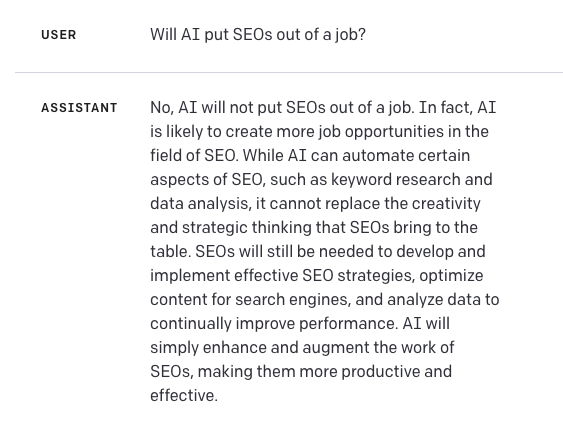SEO
Will AI Kill SEO? We Asked ChatGPT

It happens every couple of years.
First, it was Jason Calacanis and Mahalo, then the early social platforms.
We saw it again with voice search and smart assistants. For a minute, it was TikTok’s turn. Then the metaverse jumped the line.
Now, it’s ChatGPT and AI.
I’m talking, of course, about “SEO killers.”
Every now and then, a new technology comes along, and three things inevitably happen:
- Thousands of SEO professionals publish posts and case studies declaring themselves experts in the new thing.
- Every publication dusts off its “SEO is dead” article, changes the date, and does a find and replace for the new technology.
- SEO continues to be stronger than ever.
Rinse, repeat.
It would seem that search has more lives than a cartoon cat, but the simple truth is: Search is immortal.
How we search, what devices we use, and whether the answer is a link to a website will forever be up for debate.
But as long as users have tasks to complete, they’ll turn somewhere for help, and digital marketers will influence the process.
Will AI Replace Search?
There’s a ton of hype right now about AI replacing both search engines and search professionals – I don’t see that happening. I view ChatGPT as just another tool.
Much like a knife: You can butter bread or cut yourself. It’s all in how you use it.
Will AI replace search engines? Let’s ask it ourselves!
That’s a pretty good answer.
Many SEO professionals (including me) have been saying for years that the days of tricking the algorithm are long gone.
SEO has been slowly morphing into digital marketing for a long time now. It’s no longer possible to do SEO without considering user intent, personas, use cases, competitive research, market conditions, etc.
Ok, but won’t AI just do that for us? Is AI going to take my job? Here’s a crazy idea: Let’s ask ChatGPT!
 Screenshot from ChatGPT, March 2023
Screenshot from ChatGPT, March 2023AI Isn’t Going To Take Your Job. But An SEO Who Knows How To Use AI To Be More Efficient Just Might
Why? Let’s dive in.
I still see a lot of SEO pros writing articles that ask AI to do things it’s simply incapable of – and this comes from a basic understanding of how large language models actually work.
AI tools, like ChatGPT, aren’t pulling any information from a database of facts. They don’t have an index or a knowledge graph.
They don’t “store” information the way a search engine does. They’re simply predicting what words or sentences will come next based on the material they’ve been trained on. They don’t store this training material, though.
They’re using word vectors to determine what words are most likely to come next. That’s why they can be so good and also hallucinate.
AI can’t crawl the internet. It has no knowledge of current events and can’t cite sources because it doesn’t know or retain that information. Sure, you can ask it to cite sources, but it’s really just making stuff up.
For really popular topics that were discussed a lot, it can get pretty close – because the probabilities of those words coming next are really high – but the more specific you get, the more it will hallucinate.
Given the extreme amount of time and resources it takes to train the model, it will be a long time before AI can answer any queries about current events.
But What About Bing, You.com, And Google’s Upcoming Bard? They Can Do All Of This, Can’t They?
Yes and no. They can cite sources, but that’s based on how they’re implementing it. To vastly oversimplify, Bing isn’t asking for a pure chatbot.
Bing is searching for your query/keyword. It’s then feeding in all the webpages that it would normally return for that search and asking the AI to summarize those webpages.
You and I can’t do that on the public-facing AI tools without hitting token limits, but search engines can!
Ok, Surely This Will Kill SEO. AI Will Just Answer Every Question, Right?
I disagree.
All the way back in 2009 (when we were listening to the Black Eyed Peas on our iPhone 3Gs and updating our MySpace top 8 on Windows Vista), a search engine once called Live was being renamed to Bing.
Why? Because Bing is a verb. This prompted Bill Gates to declare, “The future of search is verbs.”
I love to share this quote with clients every chance I get because that future is now.
Gates wasn’t talking about people typing action words into search engines. He meant that people are trying to “do” something, and the job of search is to help facilitate that.
People often forget that search is a form of pull marketing, where users tell us what they want – not push marketing like a billboard or a TV ad.
As digital marketers, our job is simple: Give users what they want.
This is where the confusion comes in, though.
For many queries that have simple answers, a link to a website with a popup cookie policy, notification alert, newsletter sign-up popup, and ads were never what the user wanted.
It’s just the best thing we had back then. Search engines never set out with the end goal of providing links to websites. They set out to answer questions and help users accomplish tasks.
Even from the earliest days, Google talked about how its goal was to be the Star Trek computer; it just didn’t have the technology to do it then. Now, it does.
For many of these queries, like [how old is Taylor Swift?] or [how many megabytes in a gigabyte?], websites will lose traffic – but it’s traffic they were probably never entitled to.
Who owns that answer anyway? These are questions with simple answers. The user’s task is simply to get a number. They don’t want a website.
Smart SEO pros will focus on the type of queries where a user wants to do something – like buy Taylor Swift tickets, get reviews of her album or concerts, chat with other Swifties, etc. That’s where AI won’t be able to kill SEO or search.
What ChatGPT Can Do Vs. What It Can’t
ChatGPT can accomplish a lot of things.
It’s good at showing me how to write an Excel formula or MySQL query, but it will never teach me MySQL, sell me a course, or let me talk with other developers about database theory.
Those are things a search engine can help me do.
ChatGPT can also help answer many “common knowledge” questions, as long as the topic isn’t contested and is old and popular enough to have shown up in the training data.
Even then, it’s still not 100% accurate – as we’ve seen in countless memes and with one famous bank being called out for its AI-written article not knowing how to calculate interest properly.
AI might list the most talked about bars in NYC, but it can’t recommend the best place to get an Old Fashioned like a human can.
Honestly, all SEO pros talking about using AI to create content are starting to bore me. Answering questions is neat, but where ChatGPT really excels is in text manipulation.
At my agency, we’re already using ChatGPT’s API as an SEO tool to help create content briefs, categorize and cluster keywords, write complicated regular expressions for redirects, and even generate XML or JSON-LD code based on given inputs.
These rely on tons of inputs from various sources and require lots of manual reviews.
We’re not using it to create content, though. We’re using it to summarize and examine other pieces of content and then use those to glean insights. It’s less of an SEO replacement and more of a time saver.
SEO Is Here To Stay
What if your business is built around displaying facts you don’t really “own”? If so, you should probably be worried – not just about AI.
Boilerplate copy tasks may be handled by AI. Recent tests I’ve done on personal sites have shown some success here.
But AI will never be capable of coming up with insights or creating new ideas, staying on top of the latest trends, or providing the experience, expertise, authority, or trust that a real author can.
Remember: It’s not thinking, citing, or even pulling data from a database. It’s just looking at the next-word probabilities.
Unlike thousands of SEO pros who recently updated their Twitter bios, I may not be an expert on AI, but I have a computer science degree. I also know what it takes to understand user needs.
So far, no data shows people would prefer auto-generated, re-worded content over unique curated content written by a real human being.
People want fresh ideas and insights that only people can provide. (If we add an I to E-E-A-T, where should it go?)
If your business or content delivers value through insights, curation, current trends, recommendations, solving problems, or performing an action, then SEO and search engines aren’t going anywhere.
They may change shape from time to time, but that just means job security for me – and I’m good with that.
More Resources:
Featured Image: Elnur/Shutterstock

![How AEO Will Impact Your Business's Google Visibility in 2026 Why Your Small Business’s Google Visibility in 2026 Depends on AEO [Webinar]](https://articles.entireweb.com/wp-content/uploads/2026/01/How-AEO-Will-Impact-Your-Businesss-Google-Visibility-in-2026-400x240.png)
![How AEO Will Impact Your Business's Google Visibility in 2026 Why Your Small Business’s Google Visibility in 2026 Depends on AEO [Webinar]](https://articles.entireweb.com/wp-content/uploads/2026/01/How-AEO-Will-Impact-Your-Businesss-Google-Visibility-in-2026-80x80.png)















